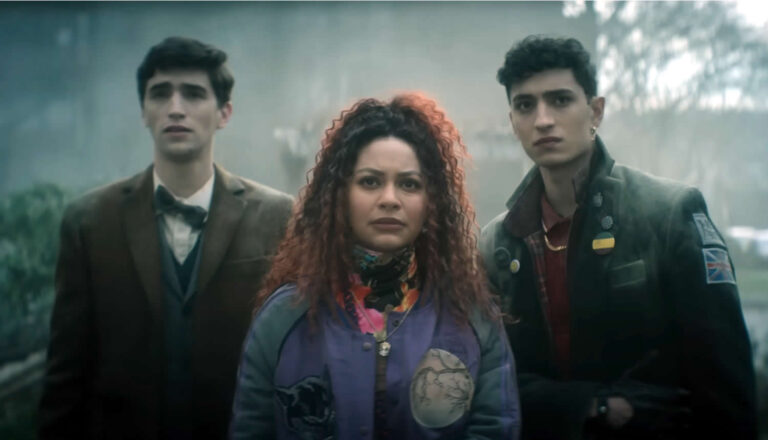
Dead Boy Detectives
Dead Boy Detectives targets teens in style and story. But it comes with very adult, problematic content.

You’re probably sick of hearing about sickness. COVID has dominated our lives for months years now, and watching a show about another deadly pandemic is probably not on your to-do list.
As well it shouldn’t be. But, as we hear about deltas and omicrons, as we discuss masks and vaccines, we can at least be grateful we’re safe from the Georgia Flu.
The flu arrived stateside one holiday season, much to the surprise of, well, apparently, most everyone. In fact, Jeevan went blithely to a Chicago production of King Lear, unaware that the world was just about to end. (It was such an innocent and carefree time that no one even wore masks.)
But the play ends early (on account of Arthur Leander, the star of the show, literally dying on stage), and Jeevan receives a dire warning from his sister that the end is nigh. In a few short hours, Jeevan’s barricaded in a Chicago apartment with his reclusive brother, Frank, and Kirsten, an 8-year-old actress whose mom and dad apparently just up and vanished.
By the time Jeevan and Kirsten leave the apartment nearly three months later, pert near everyone else is dead. And the people still alive? They’re not always the best of sorts.
Several years later, Kirsten’s one of those few still alive, traveling with a strange little Shakespearian troupe (because even violent, dystopian worlds can use a little entertainment). The troupe has become a bit like family to her. She’ll kill to protect them, and she has.
She might need to again. There’s an ooky religious cult at work in the area, too—one led by a man dubbed the Prophet. And the group thinks nothing of a little murder or kidnapping or finding young girls to be the Prophet’s newest “bride.”
But while Kirsten and the Prophet seem diametrically opposed in this strange, new world, perhaps there’s something from the old one that they share.
Station Eleven takes its title (and its plot) from a book—an award-winning 2014 novel by Emily St. John Mandel. The book, in turn, is named for another book—an unpublished graphic novel written by Miranda Carroll, who just so happened to be the first wife of Arthur Leander, the King Lear who so unceremoniously died on stage.
A graphic novel that Kirsten treasures.
Station Eleven, the show, is a story where unexpected connections slowly reveal themselves. Plot strands slowly tie the whole messy package together in clever and satisfying ways.
But we should emphasize the word messy again.
Station Eleven is messy. We see blood and violence and sickness and corpses. We can’t say how explicit the show will get regarding sexual elements, but those are clearly going to be a theme going forward (and at least one of the characters is gay). The language is needlessly crass, too.
It can be discouraging to so often critique shows for their content issues, especially when—like this—they’re pretty well crafted. This one comes with some surprisingly positive elements: Jeevan’s instant jump from unemployed “cultural critic” to surrogate father in the flu’s earliest days forms a solid nexus for the story and a backbone for who Kirsten, our heroine, becomes. The sacrifice and goodness we see from some—even under the most trying of circumstances—is surprisingly heartening, given the show’s dysfunctional backdrop. And honestly, Station Eleven can even can draw a laugh or two, as well.
But just like a train barreling down Chicago’s “L,” Station Eleven allows no deviation from its course. To travel down these tracks, you must barrel through some bad neighborhoods. And Station Eleven may not be great stop for you and yours.
After actor Arthur Leander has an apparent heart attack while playing King Lear in Chicago, unemployed Jeevan Chaudhary leaps on stage to try to help. He can’t save Arthur, but when 8-year-old actress Kirsten gets lost in the subsequent chaos, Jeevan volunteers to take her home. Alas, while on the train, Jeevan gets a call from his sister, who works at an area hospital. She tells him that a killer flu strain is going to upend the world as they know it, and that he should find their brother, Frank, and barricade themselves in until the virus subsides. “Avoid contact with anyone,” she tells him. “It’s your best chance at surviving.”
But what about the little girl?
In a grocery store parking lot, Jeevan lies to Kirsten in order to get her to come with him and, thus, save her life. We hear about other “white lies” told to people to give them a bit of comfort and see hospital workers act sacrificially—caring for the sick and dying even as they develop symptoms themselves.
We see the flu and the chaos it brings take root: An airplane falls out of the sky and crashes in a fiery inferno. The streets and sidewalks in front of a hospital are choked by the sick. A man hacks inside his car, his wheels spinning impotently on the ice as he tries to apparently plow through a tree. The corpse of an apartment security guard lies at his desk in the frozen aftermath. News footage shows fire and rioting. We watch Arthur suffer his heart attack and fall to the stage.
A man discusses attending a funeral with his boyfriend. When his boyfriend says he’s not coming, the man says he understands—then drinks a big glass of vodka, straight. Jeevan buys nearly $10,000 worth of groceries in preparation for the end, including a couple of huge bottles of whiskey. We hear a line referring to adultery in King Lear. Arthur refers to a graphic novel as the “he” that came between Arthur and his former wife. Siblings recount a childhood story of someone throwing up. We hear one use of the word “a–”, but nearly a dozen uses of the f-word.


Paul Asay has been part of the Plugged In staff since 2007, watching and reviewing roughly 15 quintillion movies and television shows. He’s written for a number of other publications, too, including Time, The Washington Post and Christianity Today. The author of several books, Paul loves to find spirituality in unexpected places, including popular entertainment, and he loves all things superhero. His vices include James Bond films, Mountain Dew and terrible B-grade movies. He’s married, has two children and a neurotic dog, runs marathons on occasion and hopes to someday own his own tuxedo. Feel free to follow him on Twitter @AsayPaul.

Dead Boy Detectives targets teens in style and story. But it comes with very adult, problematic content.

An elf mage contemplates on connection and regret as she watches her human friends grow old and pass away.